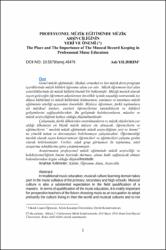Profesyonel müzik eğitiminde müzik arşivciliğinin yeri ve önemi
Abstract
Genel müzik eğitiminde; ilkokul, ortaokul ve lise müzik dersi program
içeriklerinde müzik kültürü öğrenme alanı yer alır. Müzik öğretmeni özel alan
yeterliliklerinde de müzik kültürü önemli bir beklentidir. Müziği meslek olarak
seçen geleceğin öğretmen adaylarının öncelikle içinde yaşadığı sonrasında ise
dünya kültürünü ve müzik kültürünü özümsemesi, tanıması ve tanıtması müzik
eğitiminin niteliği açısından önemlidir. Böylece öğretmen; farklı toplumlara
ait müziksel tınıları, eserleri öğrencilerine tanıtabilecek ve kültürel
gelişimlerini sağlayabilecektir. Bu gelişimde koleksiyonların, müzeler ve
müzik arşivciliğinin katkısı olduğu düşünülmektedir.
Çalışmada, farklı ülkelerden enstrümanların ve müzik objelerinin yer
aldığı ülkemizin en büyük müzik müzesi ele alınacak, öğrencilerin ve
eğitimcilerin “ mesleki müzik eğitiminde müzik arşivciliğinin yeri ve önemi”
ne yönelik tutum ve davranışları belirlenmeye çalışılacaktır. Öğretmenliği
meslek olarak seçen konservatuvar öğrencileri ve eğitimcileri çalışma grubu
olarak belirlenmiştir. Veriler, odak grup görüşmesi ile toplanmış, nitel
araştırma tekniklerine göre çözümlenmiştir.
Araştırmanın profesyonel müzik eğitiminde müzik arşivciliği ve
koleksiyonerliğinin önemi üzerinde durması, alana katkı sağlayacak olması
bakımlarından özgün olduğu düşünülmektedir. In traditional music education, musical culture learning domain takes
part in the music syllabus of the primary, secondary and high schools. Musical
culture is also a substantial expectation in the field qualification of a
maestro. In terms of qualification of the music education, it is really important
for prospective teachers of the future choosing music as an occupation to adopt
primarily the culture living in then the world and musical cultures and to not only know but also introduce them. The teacher, in this way, may be able to
introduce different tones from different cultures to the students and able to
contribute to their cultural development. It is thought that there is a
contribution of collections, museums and music record keeping in this
progress.
In this study, the biggest music museum of our country including
instruments and musical objects from different countries will be handled and
it will be tried to determine attitudes and behaviors of both students and
educators towards the place and the importance of the musical record keeping
in professional music education. Conservatory students and educators
choosing teaching as an occupation are selected as study group. Data have
been collected through focus group discussion and analyzed according to
qualitative research techniques. As the study focuses on the importance of
musical record keeping and collecting in professional music education it is
regarded as genuine in respect to its possible contribution to the field.
Source
Akademik Müzik Araştırmaları Dergisi “AMADER”Volume
3Issue
5URI
http://amader.aku.edu.tr/wp-content/uploads/2017/01/c3s5_9-asl%C4%B1-y%C4%B1ld%C4%B1r%C4%B1m.pdfhttps://hdl.handle.net/11630/4444
Collections
- Cilt 3: Sayı 5 [5]



















